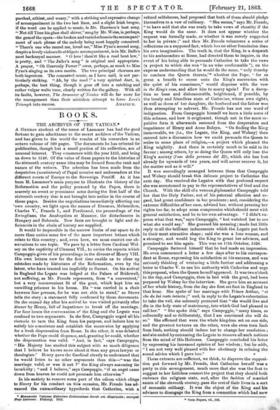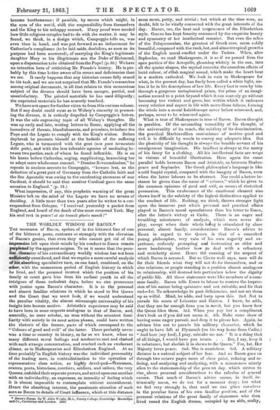BOOKS.
THE ARCHIVES OF THE VATICAN.*
A GERMAN student of the name of Laemmer has had the good fortune to gain admittance to the secret archives of the Vatican, and has given to the world the results of his researches in an octavo volume of 500 pages. The documents he has selected for publication, though but a small portion of his collection, are of unusual interest. They commence with the year 1521, and bring us down to 1510. Of the value of these papers to the historian of the sixteenth century some idea may be formed from the rank and names of the writers. The selection has been made from the despatches (nuntiature) of Papal nuncios and ambassadors at the different courts of Europe to the Sovereign Pontiff. As it has been M. Laemmer's main purpose to illustrate the history of the Reformation and the policy pursued by the Popes, there is scarcely an event or prominent actor during the first half of the sixteenth century that is not brought into notice in the course of these pages. Besides the negotiations immediately affecting our
`own country, we light upon the names of Erasmus, Melancthon, Charles V., Francis I., and Ferdinand, the proceedings of the Zwinglians, the Anabaptists at Munster, the disturbances in Hungary and Bohemia. New facts are brought to light and de- ficiencies in the chain of history are supplied.
It would be impossible in the narrow limits of our space to do more than notice some few of the more important letters which relate to this country ; and, even here, we must restrict our ob- servations to one topic. We pass by a letter from Cardinal Wol- sey on the captivity of Clement VII., to notice the reports which Campeggio gives of his proceedings in the divorce of Henry VIII. His own letters now for the first time enable us to clear up mistakes made by historians of the Reformation, even by the latest, who have trusted too implicitly to Burnet. On his arrival in England the Legate was lodged at the Palace of Bridewell, not suffering, as Mr. Froude represents, from " a convenient," but a very inconvenient fit of the gout, which kept him an unwilling prisoner in his house. He " was carried in a chair between four persons, for he was not able to stand," as Stowe tells the story ; a statement fully confirmed by these documents. On the second day after his arrival he was visited privately after dinner by Henry, full of impatience to break off the marriage. For four hours the conversation oc the King and the Legate was confined to two arguments. - In the first, Campeggio urged all his rhetoric to turn the King from his purpose, and induce him to satisfy his conscience and establish the succession by applying for a fresh dispensation from Rome. In the other, it was debated whether the Pope could dispense, and, granting he could, whether the dispensation was valid. "And, in fact," says Campeggio, " His Majesty has studied this subject with so much diligence that I believe he knows more about it than any great lawyer or theologian." Henry gave the Cardinal clearly to understand that he would listen to no other arguments than this—" was the marriage valid, or was it not ?" the King always assuming its invalidity ; "and I believe," says Campeggio, "if an angel came down from heaven he could not persuade him otherwise."
In his anxiety to remove some part of the odium which clings to Henry for his conduct on this occasion, Mr. Froude has ad- vanced the extraordinary hypothesis that Catherine, with a
• Alonlanenta Vaticana Historians Eccksiasticas; xvi. ilicatrantio ; excerpit 'ego &miner. Pribusgi. -1801. refined selfishness, had proposed that both of them should pledge themselves to a vow of celibacy. " She seems," says Mr. Froude, " to have said that she was ready to take vows of chastity if the King would do the same. It does not appear whether the request was formally made, or whether it was merely suggested to her in private ;" and then Mr. Fronde volunteers a series of reflections on a supposed fact, which has no other foundation than his own imagination. The truth is, that the King, in a despatch to his ambassadors at Rome, had directed them to inquire, in the event of his being able to persuade Catherine to take the vows (a project to which she was "in no wise conformable l'), on the express understanding that he would do the same, "only thereby to conduce the Queen thereto,"* whether the Pope, for so great a benefit to ensue unto the King's succession with the quiet of his conscience," would dispense with the vow in the King's case, and allow him to marry again! For a decep- tion so base and dishonourable, heightened, if possible, by- the lonely and friendless state of Catherine, whose own rights, as well as those of her daughter, the husband and the father was thus attempting to subvert, Mr•. Froude has not one word of indignation. From Campeggio himself we learn a little more of this scheme, and how it originated, though not in the more re- pulsive form it afterwards assumed from the desperation and impatience of Henry and Anne Boleyn. "On finding the King immoveable, we (i.e., the Legate, the King, and Wolsey) then entered into a discussion how we could persuade the Queen to retire to some place of religion,—a project which pleased the King mightily. And there is certainly much to be said in its favour ; among others, by so doing the Queen will only lose the King's society (two della persona del Re), which she has lost already for upwards of two years, and will never recover it, let the matter end as it will."
It was accordingly arranged between them that Campeggio and Wolsey should break this delicate project to Catherine the next day. She received the Legates with that profound respect she was accustomed to pay to the representatives of God and the Church. With the skill of a veteran iliplomatist Campeggio told her that the Holy Father, out of his paternal affection and re- gard, had great confidence in her• prudence; and, considering the extreme difficulties of her case, advised her, without pressing her rights too far, to adopt some compromise which should meet with general satisfaction, and be to her• own advantage. " I didn't ex- press what that was," says Campeggio, " but watched her to see what she would say." She guessed his meaning; made but little reply to all the brilliant inducements which the Legate put forth in their most attractive shape ; said she was a lone woman, and a stranger, and would beg the King to grant her advisers, and promised to see him again. This was on 17th October, 1528.
Campeggio flattered himself that he had made an impression. He even commenced a letter a few days after to his correspon- dent at Rome, expressing his satisfaction at his success, and was seriously thinking of venturing a little further and addressing a letter to Charles V. to use his authority with Catherine and urge this proposal, when the Queen herself appeared. It was two o'clock in the day, and Campeggio, then in bed with the gout, had been prepared by Wolsey for the interview. She gave him an account of her whole history, from the day she first set foot in England to that hour. She spoke of her marriage with Prince Arthur, "et the da lui resto intacta ;" and, in reply to the Legate's exhortation to take the veil, she solemnly protested that "she would live and die in the holy state of matrimony, into which God had pleased to call her." " She spoke this," says Campeggio, " many times, so collectedly and so deliberately, that I am convinced she will do so." She affirmed that were the whole kingdom set on one side, and the greatest tortures on the other, were she even torn limb from limb, nothing should induce her to change her resolution ; and she ended byentreating the Legate to remove all such notions from the mind of His Holiness. Campeggio concluded his letter by expressing his increased opinion of her wisdom ; but he adds, "I am not very well pleased with her obstinacy in refusing the sound advice which I gave her."
These extracts are sufficient, we think, to disprove the supposi- tion put forward by Mr. Froude, that Catherine herself was a party to this arrangement, much more that she was the first to suggest to her faithless consort the project that they should both embrace the religious state, and, after the fashion of married saints of the eleventh century, pass the rest of their lives in a sort of monastic celibacy. It was the object of the King and his advisers to disengage the King from a connection which had now
* State Papers, vii., 190.
become burthensome ; if possible, by means which might, in the eyes of the world, shift the responsibility from themselves and the King to his unhappy consort. If any proof were needed how little religious scruples had to do with the matter, it may be found, we think, in a design which, Campeggio tells us, was even then in hand, and was put forward as an inducement for Catherine's compliance (to be laid aside, doubtless, as soon as its purpose had been answered), of marrying the King's legitimate daughter Mary to his illegitimate son the Duke of Richmond, upon a dispensation to be obtained fromthe Pope! (p. 30.) We have no intention here of criticizing Mr. Froude's history. He is pro- bably by this time better aware of its errors and deficiencies than we are. It rarely happens that any historian comes fully armed to his task, and we are not surprised that Mr. Froude's researches among original documents, in all that relates to this momentous subject of the divorce should have been meagre, partial, and unsatisfactory. The printed materials he has used diligently; the imprinted materials he has scarcely touched.
We have not space for further extra its from this curious volume. But if any doubt could exist as to Wolsey's sincerity in promot- ing the divorce, it is entirely dispelled by Campeggio's letters. It was the sole engrossing topic of all Wolsey's thoughts. He was up early and late, writing letters to Rome, applying all the incentives of threats, blandishments, and promises, to induce the Pope and the Legate to comply with the King's wishes. Before daybreak he presents himself at the bedside of the suffering Legate, who is tormented with the gout (non poco tormentato della gotte), and with the less tolerable agonies of mediating be- tween two parties, each of whom he found inflexible. He is on his knees before Catherine, urging, supplicating, beseeching her to adopt more wholesome counsel. " Dotnine Reverendissime," he repeats in anxious accents to Carnpeggio, " beware lest, as the defection of a great part of Germany from the Catholic faith and the See Apostolic was owing to the unrelenting sternness of one Cardinal, it should be said that another Cardinal gave the same occasion to England." (p. 31.) What impression, 'if any, this prophetic warning of the great Minister left on the mind of the Legate we have no means of deciding. A little more than two years after he writes to a cor- respondent from Cologne, " I received yesterday a packet from England, and heard of the death of the most reverend York. May his soul rest in peace ! et sic transit glork mundi !"































 Previous page
Previous page